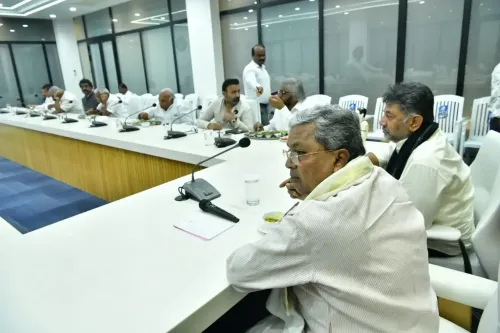What Happened During the Budget Debates of 1806 from an Indian Perspective?

Synopsis
Key Takeaways
- The 'India Budget' was a financial account for British exploitation.
- Debates revealed the indifference of British lawmakers towards India.
- India's debt was a direct result of colonial rule.
- The discussions highlighted the disconnect between rulers and the ruled.
- Low attendance illustrated the neglect of Indian concerns.
New Delhi, Oct 13 (NationPress) In the hushed, sparsely populated hall of the British House of Commons in July 1806, a series of discussions took place regarding the "India Budget". For the few parliamentarians present, it was merely a matter of financial figures, deficits, and debts surrounding a massive commercial venture on the brink of collapse.
However, through the lens of India — the extensive and silent expanse whose future these statistics represented — the conversation was something entirely different. It served as a profound and revealing audit, not merely of finances, but of the very essence of colonial governance itself. This was a reckoning that exposed a system characterized by devastating exploitation, staggering hypocrisy, and an alarming, almost casual, indifference towards the countless lives being governed and drained from across the world.
The "India Budget": A Record of Extraction, Not Governance
The phrase "India Budget" is nothing but a colonial illusion. It was not a budget intended for the Indian populace, but rather an account of resources taken from Indian soil to support a British enterprise. Lord Morpeth’s frank presentation on July 10th laid bare a financial reality of utter devastation.
He revealed sky-high deficits, including an estimated shortfall of 2,655,957 pounds for the fiscal years of 1804-5 alone.
The total anticipated costs for that year, including interest on debts, were projected to far exceed revenues by that staggering sum. This was not a sudden crisis.
By July 15th, members were candidly debating a total India Debt figure not of 30 million pounds, but "closer to 40 million than 30". Just three days later, this figure was reiterated, accompanied by claims that the East India Company was, for all practical purposes, insolvent or bankrupt.
From an Indian viewpoint, these numbers are not mere abstract figures, but a tangible measure of our own impoverishment. This was not the Company’s debt; it was India’s burden, incurred in the name of our subjugation and managed by foreign rulers.
The "charges" that led to these deficits included costs for the armies that conquered our territories, the salaries of officials who governed for their own gain, and the oppressive interest on loans taken out to sustain this system.
As the debates unveiled, loans secured in places like Lucknow and Benares, though nominally at 8 percent, actually bore a real interest rate of 12 to 14 percent due to currency disparities, further draining our local economies. Every pound of deficit discussed in London was a pound siphoned from the Indian peasant, artisan, and zamindar.
The parliamentary concern over this debt was not for India's welfare, but rather a fear for the stability of the imperial machine, which had become too costly for its own architects to uphold.
The Spectacle of Neglect
Perhaps nothing in this series of debates is more telling than the constant, bitter complaints regarding low attendance. On July 15th, members criticized the scant presence in the house during such a crucial discussion. A day later, Mr. Robson expressed his "astonishment at low attendance and the absence of ministers", threatening to suspend the proceedings altogether. This was no secret; the governance of an empire of millions was a tedious task, deemed unworthy of serious attention from the British political elite.
To the people of India, this neglect serves as the ultimate condemnation of the colonial project. Our destiny, our national wealth, and the administration of our lives were subjects of such profound indifference that our rulers could not even be bothered to attend the discussions.
The fate of India was being decided in an empty room, reduced to a mere footnote in the more urgent political dramas of England. This casual disregard from the rulers is more insulting than outright tyranny, as it reveals that India and its populace were not even deemed significant enough to warrant proper management or debate.
Our supposed guardians were absent, our concerns an afterthought, and our national treasury a topic for a "snug party" of twenty-seven members to discuss at their leisure.
The Unspoken Cause: A Kingdom's Ransom
While parliamentarians deliberated over the intricate details of financial accounts, the true cause of this fiscal disaster was an open secret, rooted in years of relentless conquest.
The debt was not a product of poor accounting or commercial losses; it was the price of India's subjugation. Mr. Francis, a persistent critic, had long denounced the "all-grasping" system of conquest and "aggrandisement" that had doubled the India Debt since 1803.
The documents on the table indicated that the debt bearing interest had ballooned from approximately 7 million pounds in 1793 to over 31 million pounds by 1806. The conflicts against Scindia, Bhonsla the Rajah of Berar, and Holkar were not distant colonial skirmishes; they were the driving force behind this financial ruin.
The British involvement, which initially commenced under the pretext of commerce with the "good understanding, and even kindness" of our native princes, had transformed by 1765 into a quest for sovereignty.
By the time of Marquis Wellesley, this had evolved into a system of aggressive expansion, coercing our rulers into subsidiary treaties, seizing their lands, and quashing any resistance.
His policy mandated that our princes accept a "considerable British force to be stationed within his dominions in perpetuity" and to "cede in perpetual sovereignty to the company an extent of territory" to cover the expenses. The vast sums necessary to finance these wars and manage the newly acquired territories were borrowed at exorbitant interest rates.
This debt, therefore, was nothing less than the accumulated bill for the destruction of our sovereignty and the plunder of our states. The parliamentarians' search for a cause in their ledgers was a deliberate act of blindness, for the true cause was inscribed across the map of India in the blood of our people and the ruins of our kingdoms.
A Shell Game of Solutions
Faced with this crisis, the proposed solution in the House of Commons was not to alleviate the burden on India, but merely to shift its weight. The primary recommendation was to transfer the Indian debt to Europe to lower the cost of interest. From an Indian perspective, this is a financial sleight of hand, not a solution. The debt, incurred for Britain's imperial agenda, would still be paid from Indian revenues.
This transfer would simply streamline the extraction process and centralize control of our national finances even more firmly in London. It was a strategy to save the Company, not to save India.
Moreover, the debates laid bare the internal disagreements among our rulers.
Members quarreled over the company's failure to meet its annual 500,000 pounds payment to the British public, a stipulation of its charter. This contention over the division of the spoils, while the source of those spoils—India itself—was collapsing into a ruinous deficit, is a perfect illustration of the colonial mindset.
Our wealth was a prize to be contested by the Company and the British state, while our own economic well-being remained unconsidered. Lord Morpeth's call for a return to "principles of moderation, justice, and economy" was not a plea for a moral awakening, but a pragmatic acknowledgment that the current system of blatant plunder had become financially unsustainable for the plunderers themselves.
Conclusion: The Silence in the Ledger
The India Budget debate of July 1806 is a historical record of great significance, not for the words spoken, but for those left unspoken. In the careful accounting of revenues, expenses, assets, and debts—from the 2,655,957 pounds deficit to the 40 million pounds debt mountain—the Indian people are a ghostly presence, their voices unheard, their suffering unrecorded. We exist solely as the source of wealth being counted.
Thus, the debate serves as a monument to the nature of imperialism. It was a system operated by a distant, distracted, and largely indifferent class of rulers. It was a system that funded its own aggression by plunging the conquered into unimaginable debt. Ultimately, when faced with its own failures, it sought not justice or restitution, but a more efficient management of its extraction.
For an Indian, the empty benches of the House of Commons in 1806 symbolize our plight more powerfully than any tyrant's decree. They represent a judgment rendered not with ill will, but with the far more chilling weight of utter disregard.
(The author is a researcher specializing in Indian History and contemporary geopolitical affairs)









